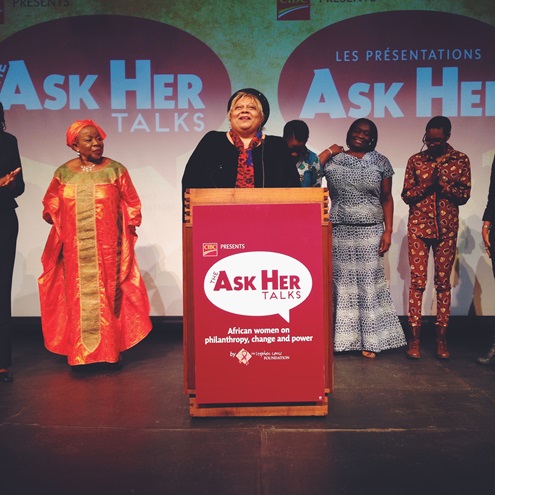
by Annette Ejiofor
On the 28th of May 2015, at the Kailash Mital Theatre at Carleton University, Ottawa was graced with the presence of powerful, dignified, innovative, inspirational, and intelligent women from Africa, for the Ask Her Talks. Presented by CIBC and pioneered by the Stephen Lewis Foundation, the evening focused on African women discussing and altering philanthropy, change, and power. The night featured Jackie Robinson (award-winning Actress and one of Canada’s foremost singers of gospel, blues, and jazz), Jessica Horn (Senior Advisor, African Institute for Integrated Responses to Violence Against Women and HIV/AIDS), Mama Bachu Nyenyezi (Programme Manager, City Of Joy, DRC), Jennifer Ayot (Senior Legal Officer, War Child, Uganda Country Office), SashOYA Simpson (Spoken Word Performer), Netty Musanhu (Executive Director, Musasa Project, Zimbabwe), and Theo Sowa (CEO, The African Women’s Development Fund).
The Stephen Lewis Foundation works with African community-based organizations that are turning the tide of HIV/AIDS in Africa, providing care and support to women, orphaned children, grandmothers, and people living with HIV/AIDS. The Ask Her Talks featured African women challenging our understanding of how philanthropy can truly improve the human condition, with women at the heart. Unfortunately, when women are placed at the centre of change, resources sent to them are scarce.
I spoke with Sashoya Simpson following the talks and asked her what she wanted the attendees to take away from her inspiring spoken word piece speaking of struggles African women face but also of the strength we inherently have and our ability to recover tremendously from anything life may throw at us. “You were not born silent. We are not weak,” responded Simpson.
Netty Musanhu, one of the speakers of the night, spoke of how making services widely accessible is important. As is working with community based clubs. Financial support is one of the many ways through which women are making changes to reduce gender-based violence and the spread of HIV. Musanhu expressed her concerns, and concerns many of us share, with how it is perceived that all African women’s problems are the same. There is a high lack of intersectionality. Any support should give regard to Grassroots Women. At times, said Musanhu, donors support for a year and then they leave. Sustainability is needed past donor support. Musanhu stated, “Women are at the front lines, but are resilient only if you ask us.” As she strode elegantly off the stage, the audience cheered in awe.
Theo Sowa, an additional speaker of the night, spoke of the African Women’s Development Fund (AWDF). The AWDF was found by five women. African women are the engine for change but money is not going to their organizations. AWDF was set up as a way to get resources to them. Sowa spoke of the year 2014 and the hardship faced. With Ebola in Liberia, Sierra Leone etc., Boko Haram’s kidnapping of the 200 girls, women being stripped in public by men in Kenya, women being imprisoned in Egypt and murdered in Libya, and more. But, 2014 reminded us of the determination and courage of African women. Women in Northern Nigeria who fought back with the creation of the #BringBackOurGirls hashtag and movement, and more. These types of narratives are important and need to be heard. So many of the narratives spread currently of African women are lies and demeaning but in actuality, African women are strong, powerful, and not victims. The correlation of women’s agency and decreasing of funds was also mentioned by Theo Sowa. The Association of Women And Development, did a study and confirmed this correlation. Less money is unfortunately given to African women when African women are the key individuals to solutions.
Theo Sowa ended her motivating and informative talk by saying that partnering with grassroots women and leaders, will make a huge change. A statement that left the audience on their feet with loud applause. The evening ended with Jackie Robinson leading the women and audience in a notable performance of “Endangered Species” by Dianne Reeves. It was a thoroughly remarkable evening, leaving all who attended motivated and devoted to creating positive change in the lives of African women.
About the writer
My name is Annette Ejiofor and I am an activist, singer, writer, belieber, and orange juice lover. I am a student at the University Of Ottawa. I believe in speaking up rather than sitting quietly and letting your moment to voice your opinions pass you by. I write from the heart and so every word stems from the pounding thud within my chest. If you don’t mind fifty thousand tweets per second, follow me on twitter and say hello. @annettesings01
